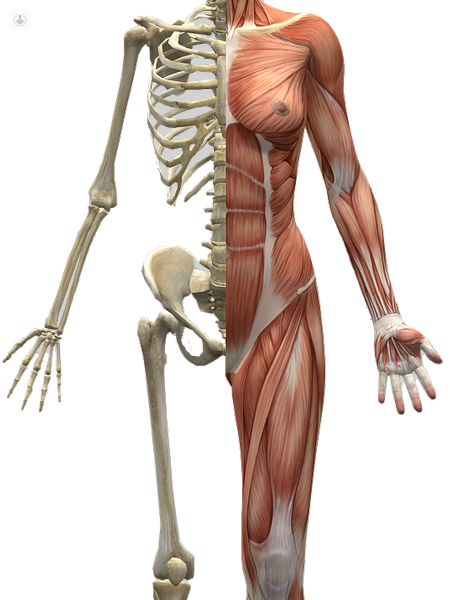


What is musculoskeletal pain?
Musculoskeletal pain can include pain felt anywhere in your bones, muscles, ligaments or tendons. The location of the pain, its severity, and how widespread it is depends on what condition or injury you have.
The type of pain you experience is related to whether it comes from your bones, muscles or tendons:
If you have musculoskeletal pain, you might also experience knock on effects such as fatigue, trouble with sleeping or a sense that your body has been overworked.

What causes musculoskeletal pain?
In most cases musculoskeletal pain is caused by an injury. Injuries come in two forms:
Wear and tear injuries are incredibly common and affect a large proportion of the adult population. For example, back pain is the single biggest cause of disability in the UK. Postural problems and repetitive strain from work can both result in musculoskeletal pain.
In rarer cases, musculoskeletal pain can develop as the result of:
How is musculoskeletal pain diagnosed?
In many cases if you have an injury diagnosis is straightforward, though you may sometimes need an X-ray or other type of scan to assess the damage that has occurred.
In other cases, where pain has gradually come on over time or you haven’t recovered from an injury as much as you would expect, diagnosis can be more complicated. Your doctor will ask about your medical history and symptoms, and might conduct some tests to see what you are able to do and what you are restricted from doing because of the pain.
How is musculoskeletal pain treated?
Treatment depends on the cause. For injuries, rest and support can help bones or muscles to repair, and you will be advised to gradually exercise the affected area to preserve function. In the meantime you may be prescribed medication to reduce swelling in the site of the injury.
More complex injuries may require surgical correction, either because:
Injuries from overuse can be treated in many ways:
In situations where the above treatments have not worked and you are still experiencing pain, you may be referred for orthopaedic surgery. Wear and tear injuries on a joint in particular may require partial or total replacement of that joint if the pain is significantly affecting your daily life.